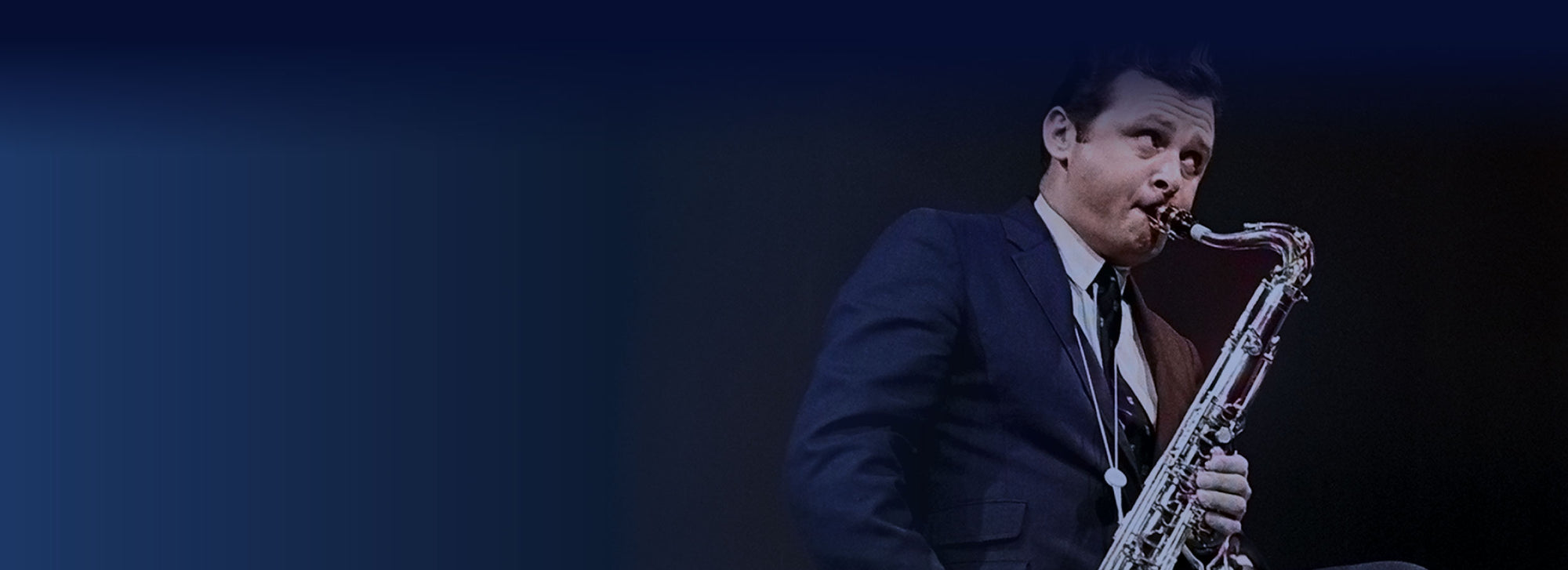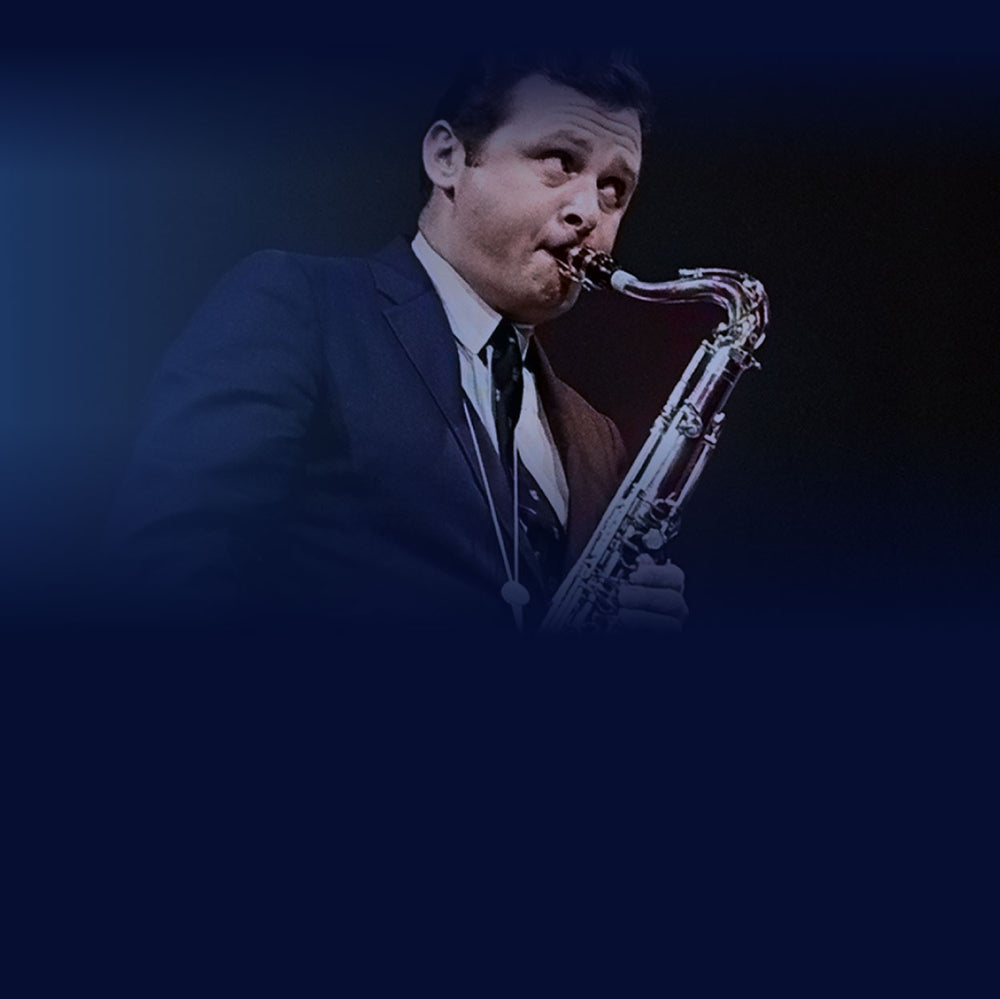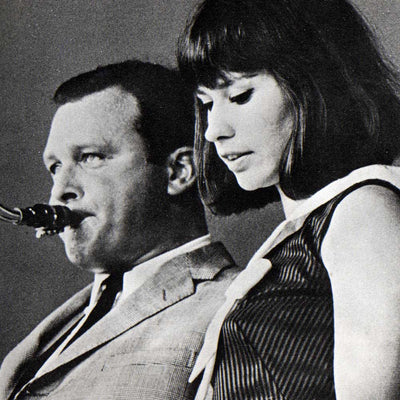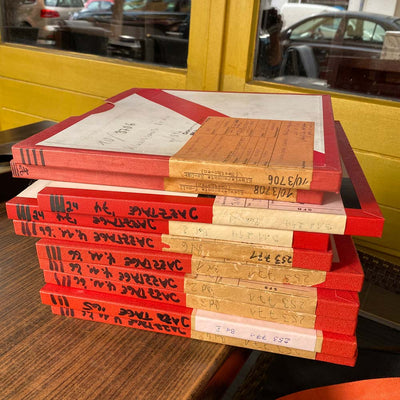


STAN GETZ
A man named "The Sound"
Tape No. 1

Tape No. 1
STAN GETZ
LIVE AT ZARDI'S 1956
"C'est au printemps 2025 que nous traversons pour la première fois l'Atlantique pour exhumer des bandes analogiques sur le sol américain. Nous nous rendons dans la banlieue de Chicago et faisons la rencontre de Vincent Tornatore qui nous remet 10 bandes, dans un état exceptionnel, contenant deux concerts de juin 1956 d'une véritable légende du Jazz - Stan Getz - dans un club non moins mythique : le Zardi's de Los Angeles..."
Frédéric D'ORIA-NICOLAS
Chercheur de trésors musicaux
STAN GETZ QUARTET
LIVE AT ZARDI'S 1956

STAN GETZ QUARTET
LIVE AT ZARDI'S 1956
The History of this discovery
It took nearly 70 years to find the tapes of these two June 1956 concerts by the Stan Getz Quartet at the legendary Los Angeles club: Zardi's! A total of 28 tracks, including irresistible ballads and standards such as "Sweet Lorraine," "Tickle Toe," "Little Girl Blue," and two never-before-heard original compositions...
THE FORMATS OF THIS DISCOVERY
Le Journal du Dimanche
“The restorations of The Lost Recordings are worthy of those devoted to master paintings”
Tape No. 2

Tape No. 2
STAN GETZ
LIVE AT THE BERLIN JAZZ FESTIVAL 1966
The Lost Recordings found the analogue master tapes of this extraordinary concert in the Berlin radio archives. How can one not be captivated by this performance, which delivers a previously unreleased version of some tracks from the legendary 1964 Verve album? From now on, these 19 unforgettable titles are added to our collection with, as always, an unequalled sound quality, thanks to our Phoenix Mastering® process and Kevin Gray's cuts, proving the evocative power and timeless freshness of their music.
STAN GETZ
LIVE AT THE BERLIN JAZZ FESTIVAL 1966

STAN GETZ
LIVE AT THE BERLIN JAZZ FESTIVAL 1966
The Story of this discovery
"It is the end of 2021 when we discover, in the archives of Berlin radio (RBB), this timeless treasure: the Stan Getz Quartet with the delicious Astrud Gilberto, as part of the Berlin Jazztage, in 1966. These 2 bands had not been opened since then... Listening to these titles with their timeless lightness we were happy and had the feeling of being invested with a real mission to save treasures like this from oblivion ."
Frédéric D'ORIA-NICOLAS
Musical treasure seeker
THE FORMATS OF THIS DISCOVERY
The Guardian
“More than impressive and wonderfully remastered... A real discovery!”
An ordinary childhood
Stan Getz was born on February 2, 1927 in Philadelphia and lived a modest childhood in New York with his Ukrainian parents. Drawn to music, he took up the bassoon and double bass before opting for the saxophone and revealing exceptional gifts. He was only 16 years old when he joined Jack Teagarden's big band swing band and then the biggest white bands of the time.
The beginning of a long and remarkable career
Noticed by Woody Herman, famous conductor of The Second Herd, Stan Getz became the soloist of the Four Brothers Orchestra, forming with Zoot Sims, Herbie Steward and Serge Chaloff, a group of talented young saxophonists who would become legendary. Influenced by Lester Young and his nonchalant style, Getz regaled audiences with his historic improvisation on the ballad Early Autmn in 1948. He became the undisputed leader of the new trend of distanced and sophisticated lyricism. However, he quickly distanced himself from the influence of Lester Young. In 1949, he left Woody Herman's orchestra and founded his own quartet with Horace Silver. He continued his work and strengthened his playing without ever losing the mastery of an incomparable velvet sound. He travels in Europe, creates a telepathic quintet with Jimmy Rainey and participates in the tours of the Jazz At The Philarmonic. Multiplying the sessions with the greatest jazzmen of the time, from Dizzy Gillespie to Oscar Peterson, the saxophonist is on all fronts despite major problems of drug addiction.

A new start
After a two-year escapade in Stockholm to recharge his batteries, Stan Getz returned to the United States in 1960 and discovered a scene in full reconstruction with John Coltrane and Sonny Rollins at its head imposing a new style: free jazz. In order to breathe new life into his career, he sought his place in this new scene. He recorded Jazz Samba with Charlie Byrd, which was an immediate success with the public and opened the field to the most diverse mixes of jazz and Brazilian rhythms. Stan Getz will dig to explore all the facets of this hybrid aesthetic and will sign with Antonio Carlos Jobim and Joao Gilberto the mythical album Getz / Gilberto, an unsurpassed masterpiece of the genre with the singer Astrud Gilberto.
Now enjoying international recognition, Stan Getz continued his exploration of more sophisticated forms of jazz. At the turn of the 70's, he signed one of the most beautiful records of his career, "Dynasty", rediscovering, in a resolutely lyrical register, the vehemence and ardor that characterized him as a young man. Throughout the 70s, Stan Getz alternated styles and registers, moving from "fusion" climates marked by the jazz-rock revolution to more classical contexts alongside Bill Evans, while continuing to celebrate the elective affinities between jazz and bossa nova. During the last years of his life, Stan Getz will return to a more traditional jazz and privilege his taste for the most refined pianists.
The end of an era
Stan Getz died on June 6, 1991, of liver cancer.
"If you like an instrument that sings, play the saxophone. At its best it's like the human voice."
OUR HAPPY MUSIC LOVERS







